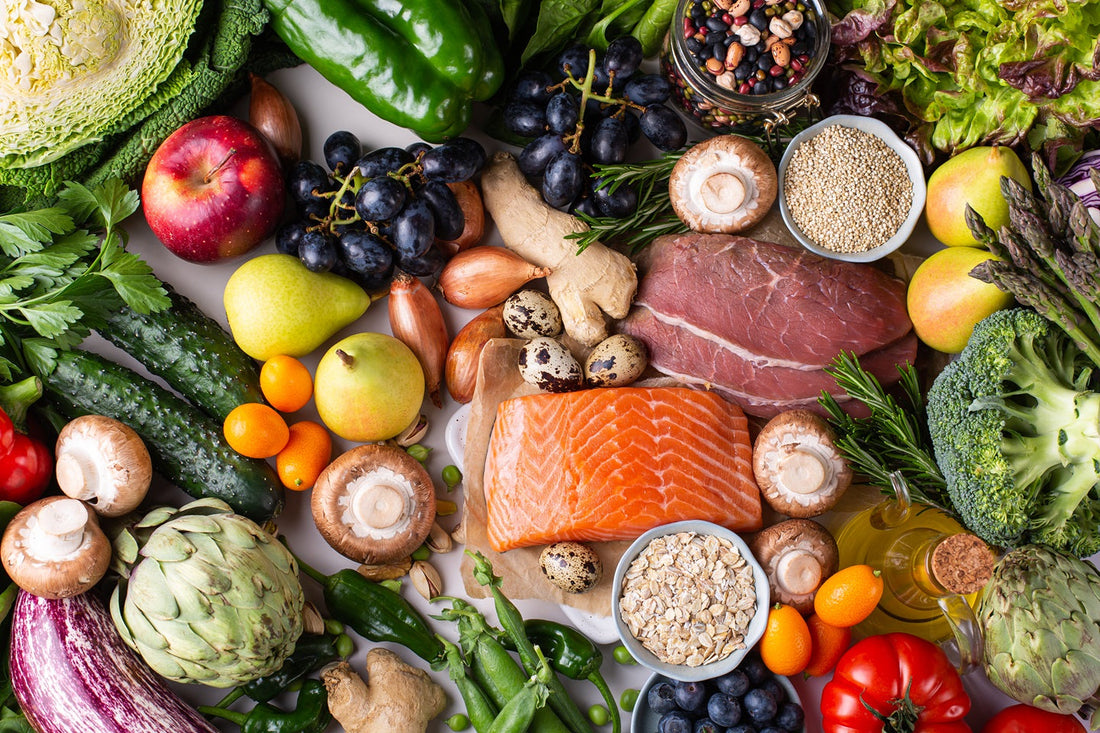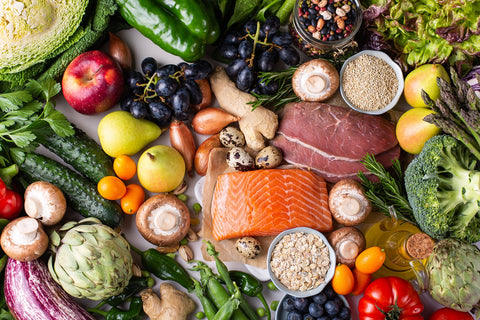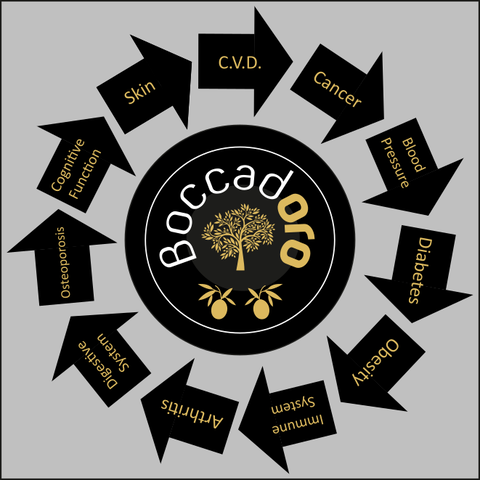
The Health Benefits of Olive Oil
The Health Benefits of Olive Oil
In this article we explore the health benefits of including olive oil as part of your daily diet, a subject that has grown in popularity in recent years.
It is important to point out that we are not medical professionals, so within this article only include claims that have been backed by significant research and are widely accepted as fact.
It is also worth highlighting that we are only referring to the health benefits of extra virgin olive oil (EVOO), and not referring to any of the lesser grades of olive oil such as refined or olive pomace oil.
We’ll also try and keep it as straightforward as possible. For anyone looking for in-depth scientific explanations behind the health benefits of olive oil, there is significant research freely available online from reputable sources should you wish to explore further.

History
Olives are one of the oldest cultivated fruit trees in the world, having been farmed for roughly 6000 years around the Mediterranean basin. Despite this, it is only relatively recently that the health benefits to humans have been observed. Research was initiated when it was identified that Mediterraneans on average lived longer and suffered from less heart disease than their northern European and American counterparts. This led in the 1950s to the formalisation of what we now know as the ‘Mediterranean Diet’, based on the research by American scientist Ancel Keys of the University of Minnesota who first identified the correlation between diet and certain health issues. The Mediterranean Diet is not a rigid set of rules, but includes a broad spectrum of diets that evolved in the cultures located around the Mediterranean basin - a diet focused on vegetables, fruits, herbs, nuts and whole grains, fish and only small amounts of meat. A key element of these diets is a significant serving of extra virgin olive oil as the primary source of fat (as opposed to butter for example).
Since the 1950s more and more research has been conducted into the subject, and is still ongoing today, as we develop a greater understanding of what causes serious disease and other health complications and how they can be prevented.

Why is Olive Oil Healthy
The reasons for olive oil being such a healthy food source can broadly be divided into three main categories: vitamins; fats; and polyphenols.
Vitamins
Olive oil is essentially the juice of the olive fruit. As with many other fruit juices, olive oil contains a variety of vitamins such as A, D, E and K. It is an excellent source of Vitamin E and Vitamin K, both of which are required as part of a healthy diet.
According to the NHS, Vitamin E “helps maintain healthy skin and eyes, and strengthen the body's natural defence against illness and infection (the immune system)”.
The NHS describes Vitamin K as “a group of vitamins that the body needs for blood clotting, helping wounds to heal” and “there's also some evidence vitamin K may help keep bones healthy”.
Fats
Olive oil is a fat – it contains no carbohydrates, fibre, protein or water. A small amount of fat is necessary as part of a healthy diet, as it is a source of fatty acids which the body cannot produce on its own, and are essential for the body’s ability to absorb certain fat-soluble vitamins such as A, D and E.
However, not all fats are the same. There are three main types of fats: saturated, unsaturated, and trans fats.
Saturated fats should be considered undesirable, certainly in large volumes as they can cause significant health issues. The main reason saturated fats are bad for your health comes down to cholesterol. Cholesterol is a fatty substance produced in the liver and is then carried in the bloodstream as either low-density lipoproteins (LDL) or high density lipoproteins (HDL). Too much saturated fat in your diet leads to high levels of LDL cholesterol in your blood, which can lead to severe health problems such as heart disease and stroke. Contrastingly, HDL cholesterol has a positive affect by taking excess cholesterol in parts of your body to the liver where it is disposed of, thereby reducing the risks. Saturated fats tend to be found in animal derived products such as meat and dairy, but also in some plant based foods such as coconut and palm oils, and are responsible for elevating the level of ‘bad’ LDL cholesterol in you blood.
Unsaturated fats come in two forms – monounsaturated and polyunsaturated, both of which can help reduce the ‘bad’ LDL cholesterol and increase levels of ‘good’ HDL cholesterol. Olive oil is primarily a monounsaturated fat (c.75%) but is also a source of polyunsaturated fat (c.10%).
The third type of fats are trans fats. These are actually a form of unsaturated fat (so often referred to as trans-unsaturated fats) but do not come with the same health benefits as other unsaturated fats. They can occur naturally in small amounts within the stomachs of animals that eat grass so are found in some meat and dairy products – but these are not damaging to your health when consumed in moderation. Artificial trans fats are the real problem and should be avoided where possible – many countries have banned their use altogether, although the UK has stopped short of an outright ban and prefers to rely on manufacturers removing them from their products. They cause the same problems as saturated fats by increasing ‘bad’ LDL cholesterol in your blood stream. They can be found in products such as margarine, commercially baked goods such as cakes, pastries and pies and fried foods - look out for the words ‘hydrogenated vegetable oil’ within the list of ingredients and avoid if possible.
So increasing the consumption of olive oil within your diet, especially when used as a substitute for saturated fats such as butter or lard, can have significant benefits to your long term health, particularly with regards to your risk of heart disease and stroke.

Polyphenols
Polyphenols are a type of compound naturally found in a wide variety of plant foods such as fruits (eg. blackberries, cherries) and vegetables (eg. broccoli, carrots), nuts (eg. almonds, hazelnuts) and other sources such as certain teas, red wine and chocolate. Over 8000 different polyphenols have been identified to date.
Polyphenols are beneficial to your health for two main reasons: firstly, they can act as antioxidants, meaning they neutralise harmful ‘free radicals’ that are produced through normal cellular activities or exposure to external factors such as smoking or pollution – if these ‘free radicals’ accumulate in your body they can be a major contributing factor in the development of chronic health issues such as cancer, autoimmune disorders, aging, cataract, rheumatoid arthritis, cardiovascular and neurodegenerative diseases (ref. U.S. National Library of Medicine).
Secondly, many of the polyphenols found in extra virgin olive oil are believed to reduce inflammation, which is seen as the root cause of many chronic illnesses. Indeed, one recently identified EVOO polyphenol, oleocanthal, has been proven to have similar anti-inflammatory properties to ibuprofen, but without the potentially severe side effects of long term use of these drugs.
It is in respect of polyphenols that extra virgin olive oil really comes into it's own - the best quality extra virgin olive oils have the highest levels of polyphenols and therefore the greatest potential positive impact on your health.

Health Benefits
There are countless claims about the areas of your health on which olive oil can positively impact, but below we have only included those that have significant research backing up the claims, and included in the International Olive Council’s (IOC) “Olive Oil Health Notes”, which is freely available to download online.
Cardiovascular Disease (CVD)
Cardiovascular diseases are the top cause of death in developed countries, and as outlined at the start of this article, the lower rates of heart issues in Mediterranean countries sparked the initial interest and research into the health benefits of olive oil.
By reducing the levels of 'bad' LDL cholesterol and increasing levels of 'good' HDL cholesterol in your bloodstream, olive oil helps reduce the risk of all the associated cardiovascular issues such as heart disease and stroke. Various recent studies have found consumption of olive oil can be beneficial in both primary prevention (i.e. reducing the risk of developing CVD in the first place) and secondary prevention (i.e. reducing the risk of a recurrence of CVD).
Cancer
It is now widely accepted that there is a correlation between diet and the prevalence of certain cancers.
Whilst the exact reasons why a diet rich in olive oil correlates with reduced instances of cancer are still being thoroughly researched, it is believed that the antioxidant properties of polyphenols and vitamins contained within olive oil have a protective affect against the development of malignant tumours through dealing with the build up of free radicals within the body.
Various studies have found positive correlations between olive oil consumption and reduced risk of breast, bowel and colon cancers. Research is on-going into how olive oil may be beneficial in reducing the risk of many other forms of cancer.
Blood Pressure
Similarly, diet has been identified as a major influence on blood pressure. High blood pressure or hypertension is the main cause of damage to arteries, which contributes to the deterioration of cardiovascular health. Studies have shown a significant reduction in rates of high blood pressure where the Mediterranean Diet is dominant.
Whilst it has not yet been established exactly which elements of the Mediterranean Diet are causing these differences, research has shown that the addition of olive oil to a diet that is otherwise unchanged results in a clear lowering of blood pressure.
Diabetes
Diabetes is one of the leading health issues in the developed world, one of the major metabolic diseases that can result in various other complications from cardiovascular disease, kidney failure, blindness and circulation disorders.
It has been proven that an olive oil rich diet is one of the best ways to both manage diabetes and prevent the development of the disease later in life.
It is believed that olive oil helps prevent insulin resistance, raising ‘good’ HDL cholesterol levels, ensuring better blood sugar level control and lower blood pressure.
Obesity
As society has evolved over recent decades, particularly in the industrialised world, people’s lifestyles have become more sedentary, whilst consuming more unhealthy foods. This has resulted in an explosion in the number of people who are overweight or suffer from obesity – which can lead to increased risk of high blood pressure, diabetes, and high cholesterol, all contributing to elevated levels of cardiovascular disease.
As a fat, olive oil is high in calories, so intuition would suggest it would contribute to weight gain, but studies have shown that obesity levels are lower where the Mediterranean Diet is prevalent, and an olive oil rich diet results in greater and longer lasting weight loss when compared to a low fat diet. This is believed to be due to the olive oil improving the desirability of the diet, making it more likely to be sustained in the medium and long term, and it encourages the consumption of more vegetables by enhancing their flavours.

Immune System
Our immune system defends the body against outside invasion from substances such as toxins, parasites and microorganisms. It has long been understood that a deficiency in vitamins and minerals can have an adverse effect on the performance of the immune system.
Olive oil contains the immune system bolstering Vitamin E, and the fatty acids within olive oil can play an important role in supporting various immune system functions, and regulating the immune system itself.
Rheumatoid Arthritis
Rheumatoid arthritis is an autoimmune disease which causes long term pain, swelling and stiffness in the joints.
It is believed the anti-inflammatory properties of olive oil can help in the treatment of arthritis, and prevent it developing in the first place – according to a recent study, people who have a significant amount of olive oil in their diet are up to 2.5 times less likely to suffer from the disease. According to www.arthritis.org: “Human, animal and lab experiments have shown that the polyphenols in EVOO effectively combat inflammation and improve arthritis symptoms in joints and throughout the body.”
Digestive System
For millennia olive oil has been prescribed as a cure for digestive system ailments, but it is only recently that these claims have been backed by significant research, and it is now known to have countless benefits, including:
-
improving the diversity of microbiomes within your stomach, meaning better gut health, which is essential for your overall health.
-
reduces the risk of reflux of food or gastric juice up from the stomach to the oesophagus.
-
the release of stomach content into the duodenum is slowed, meaning a greater sense of ‘fullness’ and allowing for the digestion and absorption of nutrients.
-
benefits the muscle tone and activity of the gall bladder which stimulates the digestion of lipids as they are emulsified by the bile, preventing the development of gallstones.
-
stimulates secretion by the pancreas, making this organ function, so recommended for conditions where pancreatic function has to be maintained such as pancreas failure, chronic pancreatitis and cystic fibrosis.
-
has a mild laxative affect that can help prevent and relieve constipation.
Osteoporosis
Osteoporosis is a condition that causes a loss in bone tissue mass, meaning bone fractures and breaks are more likely. It is often associated with ageing, but can affect younger people and women in the years after the menopause.
Olive oil helps the body to absorb calcium, which is essential in the development of bones and the prevention of bone deterioration and development of osteoporosis.
Cognitive Function
Memory loss and other cognitive function decline is an inevitable part of ageing. However, recent studies have identified diets high in monounsaturated fats such as olive oil help to reduce the rate of decline.
Research is on-going to establish exactly what causes this correlation, but it is believed that these fatty acids help the body to protect brain cell membranes, preventing their deterioration – it is certainly known that the body’s demands for fatty acids increase with age.
Whilst still at the early stages, this research offers some hope for the prevention of conditions such as dementia and Alzheimer’s Disease.
Skin
As we age, or have greater exposure to external elements such as sunlight, the skin starts to suffer from structural damage, growing thinner and losing some elasticity.
Through polyphenols that reduce free radicals accumulating and damaging skin cells, and vitamins that bolster the health of skin cells and aid the healing of wounds, olive oil can be beneficial with regards to skin degradation and related signs of ageing.
In addition to the consumption of olive oil as a food, many skin care products contain olive oil to aid moisturisation and absorption of water (although it is not appropriate for all skin types as excess oil may have detrimental affects).
Summary
It is now beyond doubt that extra virgin olive oil has a huge part to play in a healthy balanced diet, and is particularly beneficial when used to substitute other less healthy fats such as butter or lard. As more and more research is completed, a seemingly endless list of benefits of olive oil consumption are identified – it truly is a wonder of nature.
Whilst increasing in recent years, the UK still lags some distance behind our Mediterranean cousins in terms of olive oil consumption – only c.1 litre per person per year on average, compared to an astonishing c.24 litres in Greece, and 15 litres/13 litres in Spain and Italy respectively. With so many health benefits now associated with EVOO, increasing our average consumption could have significant long term benefits to the health of the UK population.

And it really isn’t a chore to increase the amount of olive oil you consume – whilst not for everyone, the unique flavours provided by a top quality olive oil only serve to enhance the food you eat, making it a more pleasant experience. From using it to shallow fry or bake, added raw to salads and vegetables, or even simply having a spoonful each day, it really is straightforward to increase your consumption.
And it is with top quality extra virgin olive oils such as Boccadoro that you will see the most benefit – not only bursting with flavour but packed with vitamins and healthy polyphenols.
